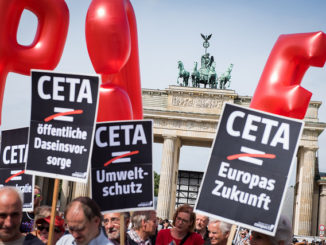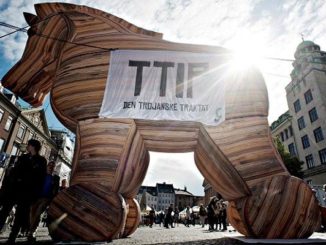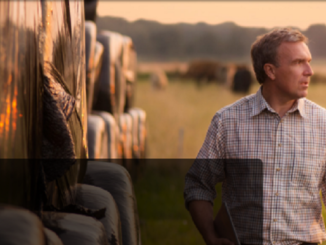Webinar: TTIP and Animal Welfare
7:00 PT/9:00 CT/16:00 CET February 26

The EU and US have very different rules on the treatment of farm animals. The EU recognizes animals as sentient beings and requires Member states to respect their welfare, banning some of the worst forms of cruelty, many of which are common in the United States. Progress has been more limited in the U.S., but animal welfare activists won a major victory with California’s passage of a new law banning eggs produced in battery cages.
The EU has proposed non-binding language on animal welfare in the draft text in the Transatlantic Trade and Investment Partnership (TTIP), but animal welfare advocates worry that this weak language will only make things worse. In fact, other language in TTIP intended to harmonize standards could jeopardize laws like the California ban and make it more difficult to raise animal welfare or food safety standards.
Please join us for a webinar on animal welfare rules in the U.S. and EU, and the potential impacts of TTIP at 7:00 PT/9:00 CT/16:00 CET on Thursday, February 26. Presenters include:
- Joyce Tischler, co-founder, general counsel, Animal Legal Defense Fund
- Olga Kikou, European Affairs Manager, Compassion in World Farming
- Moderated by Robert Pederson, ARC2020
This is the fifth in a series of webinars in partnership with ARC2020 on TTIP, agriculture and food systems.
ARC2020 together with IATP has hosted 4 webinars on TTIP.
In case you missed it or you would like to recap, you find the recordings below.
Webinar: Trading away our bees 4.11.2014
The die-off of bees and other pollinators poses an enormous threat to our food and agriculture system and environment. A growing body of scientific evidence points to neonicotinoids (neonics), a class of systemic pesticides, as a primary cause of the massive decline of bees. Last year the EU imposed a moratorium on certain neonics, and a broader review of harmful pesticides is underway. Environmental and agriculture organizations are pushing for a ban in the U.S. at both the state and federal levels, and several cities have already banned neonics.
This progress could be undermined by the push in the Transatlantic Trade and Investment Partnership (TTIP) to harmonize standards down to the lowest level. Civil society groups in the EU point to a “regulatory freeze” that is blocking progress on endocrine disruptor and neonic regulation. TTIP negotiations also threaten the EU’s use of the Precautionary Principle, which strengthens their ability to protect public health and the environment when there is scientific uncertainty. TTIP could also affect the growing number of U.S. city and state-level regulations on neonics.
Presenters include:
Jennifer Sass, Senior Scientist, Natural Resources Defense Council, See presentation
Jim Kleinschmit, Director, Climate and Energy Initiatives, Institute for Agriculture and Trade, See presentation
Martin Dermine, Honeybee Project Coordinator, Pesticide Action Network Europe, See presentation
Robert Pederson, Agriculture and Rural Convention 2020 (ARC2020), See presentation
Karen Hansen-Kuhn, Director International Strategies, Institute for Agriculture and Trade Policy
This is the fourth in a series of webinars in partnership with IATP on TTIP, agriculture and food systems.
Webinar on TTIP and Antimicrobial Resistance, 24.07.2014
Antimicrobial Resistance (AMR) is one of the greatest threats to public health. Margeret Chan, Director-General of the World Health Organization has warned, “A post-antibiotic era means, in effect, an end to modern medicine as we know it. Things as common as strep throat or a child’s scratched knee could once again kill.”
The dependency of current intensive livestock production systems on antibiotics is a priority issue for civil society movements on both sides of the Atlantic. Campaigns for prudent use of antibiotics in the livestock sector in both the EU and USA seek to provide solutions to this urgent challenge. The Transatlantic Trade and Investment Partnership threatens progress made in reducing AMR and promotes even more intensive livestock systems. The U.S. and the EU need to strengthen standards that prevent the use of antibiotics in the food system.
Presenters include:
Steven Roach is the food safety program director of Food Animal Concerns Trust. His current work focuses on the human health impacts on animal agriculture including antimicrobial resistance. He has represented Consumers International as a delegate at various CODEX Committee meetings critical for international antibiotics standards.
Richard Young is the policy director of the Sustainable Food Trust. Much of his current work focuses on various aspects of “true cost accounting” for agricultural externalities, including the cost of antibiotic overuse on farms.
Shefali Sharma is director of IATP‘s Agricultural Commodities and Globalization Initiatives. For the last 18 years her work has focused on international trade, food and agricultural policies, agriculture and climate change, accountability of international development banks and the implications of these issues for social justice.
Moderation: Robert Pederson ARC2020. ARC2020 includes over 150 civil society organizations working on issues affected by the EU’s Common Agricultural Policy (CAP).
Webinar on TTIP and GMOs, 08.07.2014
On June 16, USDA Secretary Tom Vilsack cautioned European Union members against raising health or safety risks when banning the cultivation of genetically modified organisms (GMOs). The debate over GMOs is intensifying as agribusiness on both sides of the Atlantic attempt to weaken standards on genetically modified organisms and their labeling through a new trade agreement.
For civil society movements in the EU and the U.S., labeling is a burning issue. Labeling campaigns are already underway in 26 U.S. states. In the EU, civil society is fighting the introduction of new varieties and imports of GM feed. The Transatlantic Trade and Investment Partnership (TTIP) is the forum where corporate interests seek to derail these movements.
Speakers:
- Mute Schimpf, Food Campaigner at Friends of the Earth Europe
- Debbie Barker, International Director at the Center for Food Safety
Webinar Trade rules for poultry and pork: safe for whom?, 20.05.2014
ne of the flashpoints in the Transatlantic Trade and Investment Partnership (TTIP) talks is the pressure to bring EU standards to U.S. levels in ways that expand the use of industrial agriculture despite the risks to human and animal health and worker safety. A range of issues are on the table including the EU’s refusal to allow imports of chicken rinsed in chlorine and other harsh chemicals and the use of Ractopamine in pork production. Please join us for a webinar to learn about the trade, food safety and labor rights issues involved in this debate. This is the first in a series of webinars on TTIP, agriculture and food systems.
Speakers:
Dr. Steve Suppan, from the Institute for Agriculture and Trade Policy(U.S.)
Tom Fritzsche from the Southern Poverty Law Center (U.S.)
Camille Perrin from the Bureau Européen des Unions de Consommateurs(BEUC)
The webinar is moderated by Robert Pederson from the ARC2020 coalition.





